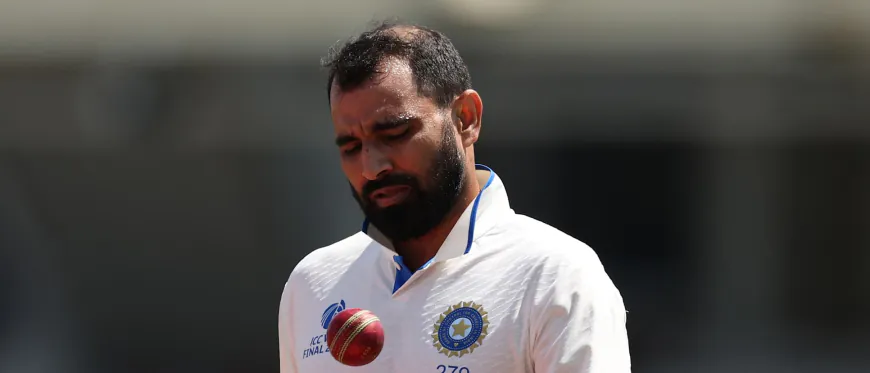Religious Row Over Holi Celebration-Mohammed Shami's Daughter in the Crosshairs
A religious scandal has been caused by Mohammed Shami's daughter celebrating Holi, with outrage and angry reaction. The news has created personal freedom and religious tolerance debates in sports.

Indian fast bowler Mohammed Shami was again at the center of a religious row following a cleric criticising his daughter for celebrating the festival of colors Holi. The controversy initially surrounding the pacer's unwillingness to remain abstinent during Ramzan now has reached his family, gaining even greater spotlight from religious leadership.
The Cleric's Charges Against Shami's Daughter
In a video message released on Saturday, Maulana Shahabuddin Razvi, the president of the All India Muslim Jamaat, took aim at Shami’s young daughter for participating in the Hindu festival of Holi. He stated that while a child who does not understand religious doctrines should not be judged, if she was aware of Islamic laws and still chose to celebrate, then it would be considered "against Shariat."
Razvi’s remarks stirred debate as he reinforced his stance that Muslims should refrain from celebrating Holi. He insisted that Shami, as a public figure, should ensure his family adheres to the principles of Islam and not engage in activities that are not part of Shariat.
Previous Criticism of Mohammed Shami
This is the second time Maulana Shahabuddin Razvi had made a public complaint against Shami. The cleric last week announced that the cricketer had sinned by not fasting during Ramzan. His criticism escalated further after a clip was obtained of Shami taking a sip of water during an ICC Champions Trophy match against Australia on March 6.
Razvi had then said, "According to Shariat, he is a criminal. He shouldn't have done it at all." He also said fasting is obligatory in Islam and not fasting without a valid reason is sinful.
Apart from this, he also asked the cricketer to be an inspiration by being under the dictates of Islam. "Playing cricket is not wrong, but Mohammed Shami must do justice to his religion. I want Shami to abide by Sharia laws and account towards his religion," Razvi further said.
Shami's Silence in the Wake of Backlash
In spite of repeated denouncement, Mohammed Shami has not yet reacted to the allegations made against him or his family in the public sphere. The cricketer, who was a key performer in India's recent success in the ICC Champions Trophy, instead engaged himself with his professional obligations.
While Razvi had welcomed the Indian team's victory, his message to Shami was crystal clear and loud—stay within religious teachings and do not indulge in activities that go against religious principles.
Discussion on Religious Freedom and Personal Choices
The row once more highlighted the question of religious freedom and personal choice, particularly for public figures. Most people believe that Shami, like anyone else, should be able to practice his religion the way he likes. Some people believe that as a Muslim public figure, there is the obligation to uphold Islamic values.
Religious debates over personal actions are not new in India, where individuals from diverse faiths often face scrutiny for their choices. However, the targeted criticism of Shami’s daughter for participating in Holi has raised questions about the extent to which religious leaders should interfere in personal and family matters.
Shariat and Social Norms-A Complex Intersection
The words of the cleric underscore the constant struggle of religious traditions blending with prevailing social customs. While right-wing scholars hold on to the idea that religious law has to be followed strictly, others have suggested a more constrained understanding in which such blending into society is made possible.
Most Islamic scholars promote that religious beliefs at an individual level are not to be decided based on public belief and that participation in cultural celebration does not jeopardize religious conviction. In a multicultural country such as India, where there are several religions, the same is largely sensitive issues for discussion.
Conclusion-Balancing Faith and Personal Freedom
The controversy over Mohammed Shami and his daughter's Holi celebration is an indication of a broader argument about the balance between religious faith and individual freedom. While the likes of clerics Maulana Shahabuddin Razvi focus on adhering to Shariat, there is also a sense that religious ideals cannot be thrust upon individuals, particularly in a multi-religious society.
As the scandal unfolds, one thing is certain—public servants such as Shami will continue to be questioned about their personal decisions. But the question at the grand level is: Should outside religious leaders dictate personal religious practices, or should individuals be allowed to follow their religion as they wish?



 admin
admin